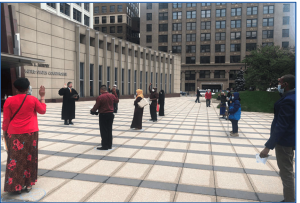Understanding Personal Injury Law in Ohio: Your Simple Guide

When you’re injured in an accident, it can be hard to know what to do next. You may be dealing with pain, stress, and medical bills. However, understanding your legal rights in Ohio can help you take control of the situation. This guide will walk you through what personal injury law means, what steps to take, and how a lawyer can help you.
What Counts as a Personal Injury?
First of all, a personal injury happens when someone is hurt because another person acted carelessly or recklessly. This could include car crashes, falls on unsafe property, dog bites, or injuries at work. If someone else’s actions caused your injury, you may be able to get financial compensation.
Don’t Wait Too Long to File
Next, Ohio has a legal time limit for personal injury cases. In most situations, you only have two years to file your claim. This is known as the “statute of limitations.” If you wait too long, you may lose your right to seek compensation. Therefore, it’s important to act quickly and talk to a lawyer early on.
Understanding Shared Fault in Ohio
Furthermore, Ohio uses a rule called “modified comparative fault.” This means more than one person can be partly to blame for an accident. For example, if you’re 20% at fault, your compensation will be reduced by that percentage. However, if you’re more than 50% responsible, you won’t be able to recover anything. Because of this, it’s important to fully understand how fault may be shared in your case.
What You Can Be Compensated For
Additionally, personal injury claims can include different types of damages, such as:
- Medical bills – from emergency care to follow-up treatments.
- Lost income – if you miss work while recovering.
- Pain and suffering – for physical and emotional distress.
In short, the goal of these damages is to help you recover both financially and emotionally. Keeping records of your injuries and expenses will support your claim. As a result, you’ll have a stronger case.
Steps to Take After an Injury
If you’ve been hurt, here are four key steps that can protect your case and improve your chances of success:
- Get medical help right away. Even if you feel fine, it’s smart to be checked by a doctor. This creates a medical record of your injury.
- Take photos and gather details. This includes the scene, damage, your injuries, and contact info for witnesses. Clear evidence makes your case stronger.
- Stay off social media. Insurance companies may look for reasons to deny your claim. Posts about your daily life may be used out of context.
- Talk to an attorney as soon as possible. The sooner you speak with a lawyer, the better your legal protection will be. An attorney can deal with the insurance company and paperwork for you.
Why a Lawyer Makes a Big Difference
Of course, you could try to handle a claim on your own. However, having a personal injury lawyer by your side often leads to better results. Lawyers understand how to present your case, negotiate with insurance companies, and get the best possible outcome. As a result, you’re more likely to receive the full compensation you deserve. In addition, you won’t have to handle the stress alone.
Learn More About Ohio Law
For more in-depth legal information, the State of Ohio offers free public access to its laws. You can read about personal injury rules directly at:
Ohio Laws and Rules – codes.ohio.gov
Read More from Larry Slagle Law
If you found this post helpful, you may also enjoy these other articles on our blog:
- What to Do After a Dog Bite Injury – Legal Help
- Top Personal Injury Attorneys in Massillon, Ohio
- What to Do After a Car Accident in Northeast Ohio
- Finding Joy in Everyday Life
Contact Larry Slagle Law Today
If you’ve been injured and want to understand your legal options, we’re ready to help. Contact us today for a free consultation. We’ll review your case, explain your rights, and guide you through the process. That way, you can move forward with confidence and peace of mind.
Visit: larryslaglelaw.com/contact
Disclaimer: This article is for general information only and is not legal advice. Please speak with an attorney about your specific situation.










